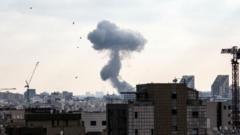On June 22, 2025, after the U.S. executed significant military strikes on Iranian nuclear sites, Israelis experienced a mixed reaction ranging from hope to anxiety regarding the future.
Israel Faces Uncertainty Amid U.S. Military Strikes on Iran

Israel Faces Uncertainty Amid U.S. Military Strikes on Iran
As the U.S. expands its role in the Israel-Iran conflict, public sentiment in Israel reveals a deep divide.
In the early hours of Sunday, the landscape of the Israel-Iran conflict shifted dramatically. The United States military conducted extensive airstrikes on three critical Iranian nuclear facilities, prompting various reactions among Israelis, from joy and optimism to apprehension concerning the potential repercussions of this bold move.
Supporters of the intervention celebrated the possibility of a new chapter for Israel, envisioning a future devoid of the existential threat posed by a nuclear-armed Iran. This sentiment was echoed by several public figures, including Yair Lapid, leader of the political opposition, who openly expressed gratitude to U.S. President Trump, labeling the strikes as “historic” and asserting a newfound sense of safety.
Conversely, there was palpable fear among many citizens who worried that the U.S. military engagement might trigger a fierce retaliatory response from Iran, escalating into an extended and more devastating conflict. As missiles rained down from Iran shortly after the airstrikes—forcing millions into bomb shelters—these fears intensified.
This deep-seated division reflects broader societal tensions in Israel. Families found themselves divided in opinion; some celebrated while others clung to caution. Discussions flowed in bomb shelters and across social media, illustrating the complex emotions swirling within a nation suddenly thrust into a new reality defined by uncertainty and hope. The days ahead hold significant implications as both nations grapple with the outcomes of this momentous intervention.























